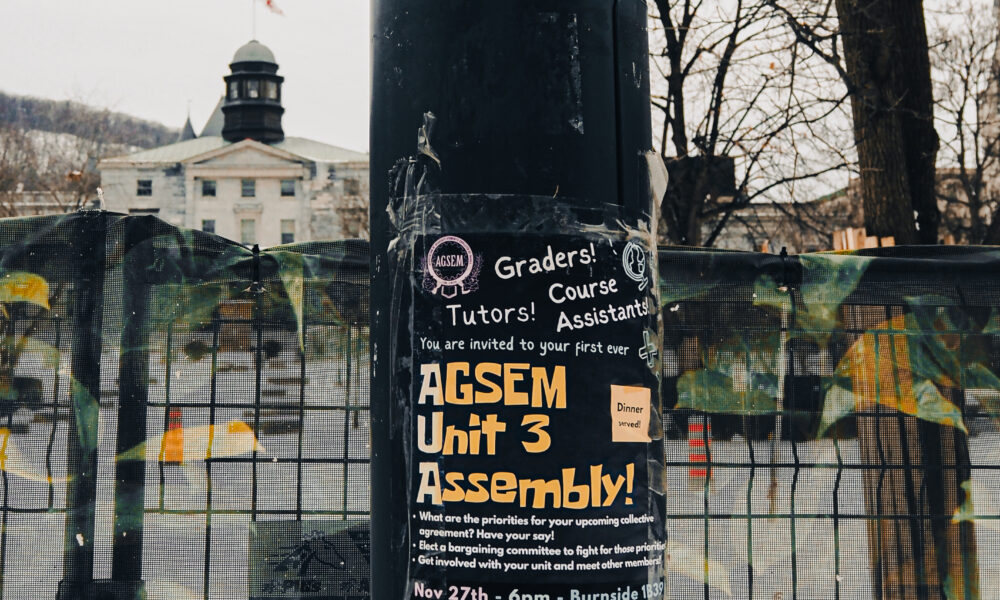On Nov. 27, the Association of Graduate Students Employed at McGill (AGSEM) elected a bargaining committee to negotiate on behalf of Unit 3, representing over 250 members. Unit 3 is composed of “course-based academic casuals,” which include graders, course assistants, and graduate teaching fellows. Unit 3 is separate from AGSEM’s Units 1 and 2, which represent teaching assistants (TAs) and invigilators, respectively.
Despite Unit 3’s fairly recent formation, they have already elected bargaining committees to negotiate working conditions. AGSEM’s priorities for Unit 3 include pay equity with TAs, protections against harassment and discrimination, and clearer workload definitions. All members are also able to voice their own experiences during negotiations as part of Unit 3’s open bargaining agreement.
Donnie Morard, a PhD candidate in History and Classical Studies and member of the Unit 3 Bargaining Committee, elaborated on the negotiation process in an interview with The Tribune.
“Unit 1 TAs went into bargaining last year, so we pushed really hard to make sure these other groups of workers would be protected under a union,” Morard said. “One of the key issues is McGill creates these positions of graders who oftentimes have very similar jobs or tasks as TAs.”
Morard explained that this lack of distinction between a TA’s and a grader’s duties can create inequities. Although some TAs may head tutorials, run office hours, and officiate labs, the responsibilities of many TAs can also be limited to only grading assignments—much like Unit 3 workers.
“Some TA-ships are simply just grading. It’s the exact same job, [a grader] is just as qualified, but it’s more than a $10 [CAD] difference [in pay], along with less protections in terms of hiring and workloads,” Morard said. “We want to close that gap.”
Megan Millet, U3 Arts and a member of the Unit 3 Bargaining Support Committee, noted that this disparity between jobs falling under Unit 3 and those under other Unit divisions varies by department and faculty, making it difficult to ensure consistent protection for AGSEM members.
“What we’ve noticed in Unit 3 is that [McGill] has like 50 different titles for job postings to make sure it is difficult to make sure who falls under Unit 3,” Millet said in an interview with The Tribune. “We’re trying to consolidate this to make sure everyone can be represented, and so that McGill can’t just create new positions whenever they want.”
While McGill is aware of Unit 3’s demands, they have not yet met with AGSEM to discuss them. However, Morard argues that McGill can negotiate the non-monetary aspects as soon as possible.
“There’s a lot of non-monetary aspects to our collective agreement as well, such as hiring practices or topics dealing with harassment and discrimination.” Morard stated. “One of the things we’ve proposed is to hold off on the monetary demands, and we can essentially submit on the non-monetary proposal and start working on this to get the ball rolling.”
However, seeing as the semester has only just begun, Morard expressed some understanding for McGill’s slow deliberation process. In the meantime, AGSEM continues to assess their priorities for future negotiations.
“As of now, we are gathering data by calling up students and Unit 3 members from other departments and faculties for their experience,” Millet explained. “We’re always looking for more people to help join us to make sure we can represent everyone properly.”
In an email to The Tribune, the McGill Media Relations Office (MRO) declined to share the details of their negotiations with AGSEM.
“McGill works with well over a dozen unions, doing our utmost to undertake all negotiations in a timely manner,” the MRO wrote. “That said, we do not comment publicly on details of talks with them.”
Despite these delays, Morard remains optimistic about the future of labour relations at McGill.
“[Unions] create solidarity among different groups of workers on campus and, even though I think the administration doesn’t necessarily like this change, we see McGill union culture becoming stronger,” Morard stated. “I think [unionizing] is not something we can do at the bargaining table, but instead something that we could just do.”







